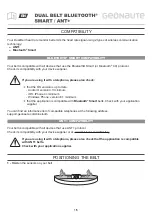
User Manual ET1302L
19
CAN ICES
-
3(B)/NMB
-
3(B)
This device complies with Industry Canada’s license-exempt RSSs. Operation is subject to the following two conditions:
(1) This device may not cause interference
, and
(2) This device must accept any interference received, including interference that may cause undesired operation..
Le présent appareil est conforme aux CNR d’Industrie Canada applicables aux appareils radio exempts de licence. L’exploitation est autorisée aux deux
conditions suivantes:
(1)
l’appareil ne doit pas produire de brouillage;et
(2) l’utilisateur de l’appareil doit accepter tout brouillage radioélectrique subi, même si le brouillage est susceptible d’en compromettre le fonctionnement.
Notice to Users in the European Union:
Use only the provided power cords and interconnecting cabling provided with the equipment. Substitution of provided cords and cabling may compromise
electrical safety or CE Mark Certification for emissions or immunity as required by the following standards:
This In
formation Technology Equipment (ITE) is required to have a CE Mark on the Manufacturer’s label, which means that the equipment has been
tested to the following Directives and Standards: This equipment has been tested to the requirements for the CE Mark as required by EMC Directive
2014/30/ EU as indicated in European Standard EN 55032 Class B and the Low Voltage Directive 2014/35/EU as indicated in European Standard EN
60950-1.
General Information to all Users:
This equipment generates, uses and can radiate radio frequency energy. If not installed and used according to this manual, the equipment may cause
interference with radio and television communications. There is, however, no guarantee that interference will not occur in any particular installation due to
site-specific factors.
1. To meet emission and immunity requirements, the user must observe the following:
a. Use only the provided I/O cables to connect this digital device with any computer.
b. To
ensure compliance, use only the provided manufacturer’s approved line cord.
c. The user is cautioned that changes or modifications to the equipment not expressly approved by the party responsible for compliance could void
the user’s authority to operate the equipment.
2. If this equipment appears to cause interference with radio or television reception, or any other device:
a. Verify as an emission source by turning the equipment off and on. If you determine that this equipment is causing the interference,
try to correct the interference by using one or more of the following measures:
i.
Move the digital device away from the affected receiver.
ii. Reposition (turn) the digital device with respect to the affected receiver.
iii.
Reorient the affected receiver’s antenna.
iv. Plug the digital device into a different AC outlet so the digital device and the receiver are on different branch circuits.
v. Disconnect and remove any I/O cables the digital device is not using.
(Unterminated I/O cables are a potential source of high RF emission levels.)









































